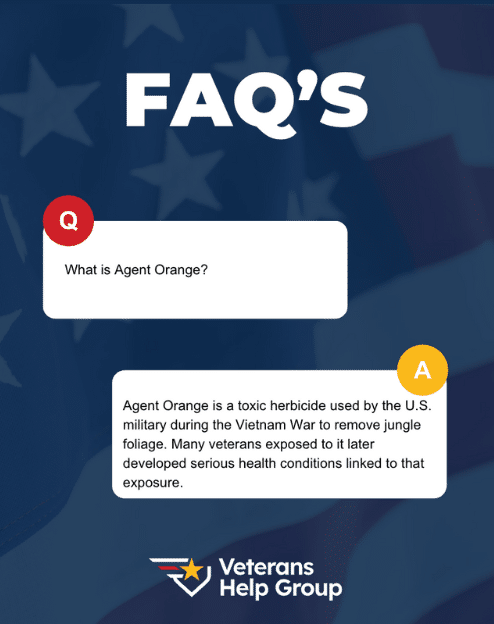VETERANS HELP GROUP
We Will Fight For you
Agent Orange is an herbicide used notoriously during the Vietnam War. From 1961 to 1971 military members sprayed more than 20 million gallons of Agent Orange on trees and vegetation to remove the foliage that provided enemy cover. Unfortunately, the exposure to Agent Orange caused numerous diseases and long-term health problems; meaning, millions of U.S. veterans were negatively impacted. The dioxin in Agent Orange can cause type 2 diabetes, heart disease, chloracne, cancer, liver problems, immune system dysfunction, nerve disorders, muscular dysfunction, hormone disruptions, miscarriages and other problems with developing fetuses. Thus, in 1991 the Agent Orange Act was signed mandating some diseases associated with Agent Orange be presumed to be service-connected.
Veterans eligible for this presumption are veterans who:
- Served in Vietnam between January 9, 1962, and May 7, 1975
- Served in or near the Korean demilitarized zone between April 1, 1968, and August 31, 1971
- Served on a Thailand Air Force base from January 9, 1962, and May 7, 1975, and flew on or worked on C-123 aircraft.
- Additionally, if you were involved in herbicide testing or storage you can also argue for Agent Orange presumption.
Why We Practice in Agent Orange Exposure Veterans Law.
While the VA should always provide disability benefits to the veterans who were exposed to Agent Orange, the VA errs and wrongly denies veterans their benefits, rates them too low, or assigns them incorrect effective dates. Veterans who fought for us deserve advocates who will fight for them.
Veterans Help Group works with veterans across the United States to get them the Agent Orange-related disability benefits they deserve. Appealing to the VA can be a complicated and frustrating process, but at Veterans Help Group we have 24 years of experience fighting for veterans, we are confident in our ability to hold the VA accountable.

How Agent Orange has impacted veterans
An estimated 3 million veterans and their families have been put at risk by Agent Orange exposure. There are about 50 diseases connected to exposure and almost 20 birth defects recognized in the children of Vietnam veterans. The VA recognizes the following conditions for the Agent Orange Presumption:
- Chloracne or other acneform diseases consistent with choloracne
- Soft-tissue sarcoma
- Non-Hodgkin’s lymphoma
- Porphyria cutanea tarda
- Hodgkin’s disease
- Respiratory cancers (lung, bronchus, larynx, or trachea)
- Multiple myelomas
- Prostate cancer
- Acute or subacute peripheral neuropathy, now classified as early-onset peripheral neuropathy
- Type 2 diabetes mellitus
- Chronic Lymphocytic leukemia
- AL amyloidosis
- Ischemic heart disease
- Chronic B-cell leukemia
- Parkinson’s disease
Moreover, some children were born with birth defects because of their parent’s exposure. Eligible people can get VA compensation, health care, and vocational training. Agent Orange has significantly impacted both veterans and their families and we want to help.
EXPERIENCE
Veterans Help Group understands veterans. Many of our team members are veterans themselves, and others have loved ones that are veterans. We understand the fatigue that comes with working with the VA. We know how complex Agent Orange claims can become, but we deal with them every day. After 24 years of practice, Veterans Help Group has fine-tuned our protocol to ensure we’re consistently following up and holding the VA accountable so you get your benefits as fast as possible.
Steps to Take
- File a claim.
- Obtain a Medical Diagnosis. Is your diagnosis one of the included conditions on the list above? If not, is it secondarily connected to one of the above conditions?
- Do you have proof in your military records that you served in one of the designated places to get the Agent Orange presumption?
- If not, can you get a statement from someone you served with to prove you should get the presumption?
- Call Veterans Help Group at 800-953-6224, or click the button below for a free case evaluation.
Tell us about your case
Get a free disability case evaluation
Secondary Conditions
When filing claims, it is also important to consider if any of your Agent Orange connected conditions caused a secondary condition. See the following list of common conditions that are secondary to Agent Orange exposure.
Conditions Secondary to Diabetes Mellitus Type 2
- Peripheral Neuropathy
- Diabetic Retinopathy
- Erectile Dysfunction
- Kidney Disease / Nephropathy
- Hypertension
- Arteriosclerosis
- Heart Disease
- Stroke
- Amputations
Depression Secondary to Cancer, Parkinson’s Disease, or Ischemic Heart Disease
Erectile dysfunction Secondary to Prostate Cancer
WHAT OUR CLIENTS SAY
FREE CASE EVALUATION
"*" indicates required fields


